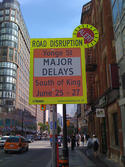The boomer's long domination of American politics, culture and economics will one day come to an end. A new generation--the so-called millennials--will be shaping the outlines of our society, but the shape of their coming reign could prove more complex than many have imagined.
Conventional wisdom, particularly among boomer "progressives," paints millennials--those born after 1983--as the instruments for fulfilling the promise of the 1960s cultural revolt. In 2008 the left-leaning Center for American Progress dubbed them "The Progressive Generation." read more »






















